Perennial: An Interview with Anthony Muthurajah
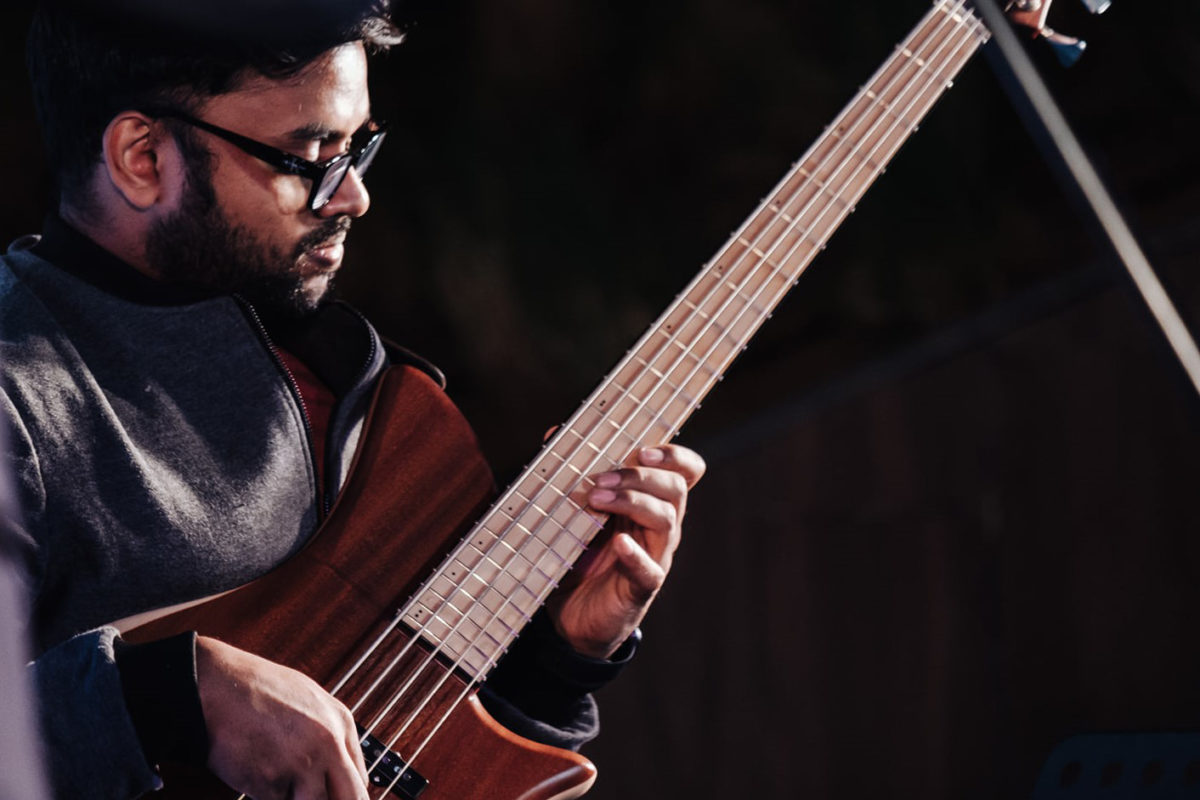
Multi-instrumentalist and music educator Anthony Muthurajah has released a truly impressive new album of original fusion compositions. Anthony brings the fire on this second album in the form of phenomenal playing, great compositions, and excellent production. As with most bassists around the world, my introduction to Anthony Muthurajah was through his fantastic YouTube bass lessons.
Hey Anthony, thanks for reaching out and reviving the idea of doing this interview. I’ve been looking forward to it! I look forward to hearing about your project and about you.
Yeah, I’m glad I reached out because I was just remembering talking to you when I put out the first record. I was just like, wait a second, I need to get back in touch again. You know?
I’m grateful you did! I heard your record, and the writing is fantastic! The playing is unbelievable! The production is brilliant! You hit every highlight that’s necessary for a great record!
Oh, thank you so much!
I know you’re based in Dubai and you’re gigging and teaching there, right?
Yeah. I primarily gig here. I don’t teach locally, like at a school, at least as of now. But most of my teaching I do online.
Your online lessons are just top-notch! As far as I’m concerned, you’re one of the best teachers. You know, your videos are definitely at the top in terms of the quality of your information and your presentation. So, hopefully, that’s giving you a lot of private students as well.
Yeah, it definitely has brought in a good number of students and in particular students who really know what it takes to study, which is what makes it great. Because a lot of times you wind up in situations where you just end up teaching because you just have to. But for me, I’m fortunate and grateful that my students are a blessing to work with overall.
That’s great. I’ve been following you from a distance for a long time now. I know that compared to a lot of bass players, you haven’t been playing the bass for a long time. I mean, at least for the high level you’ve achieved, it’s just mind-blowing that you’ve only been at it for around 10 years or so.
Yeah, About 10.5 years, around.
That’s unbelievable! So do you come from another instrument to the bass?
Yeah. I was originally a drummer. So that’s where I started in my preteen days. I grew up playing in church out here in the Middle East, in Bahrain. We had a lot of American people, actually, because we had the American military base. So a lot of them used to come to our church, so gospel music rubbed off on me quite early. So I grew up playing drums and eventually got into the guitar because I started listening to heavy metal.
Then when I went to Music College for a bit. That’s where things started to kind of change because I started playing a lot more bass because there were just never enough bass players around. And then I realized, you know what? I like the bass because it seems to put up a fight with me. It wasn’t as natural as how I felt with the drums or the guitar. So I thought, yeah, I’m gonna try my hand at the bass. I’m really glad I did because it really shaped me in ways I can’t imagine.
Well we’re grateful because of your contributions, especially with respect to your approach in explaining various issues related to music theory. You are very, very good at it! And your delivery is natural. You don’t beat around the bush, you get right to it. Also, the format of your video is very succinct. Even though our conversation is not about your videos, I feel the need to mention them because of how good they are. Can you tell me about your record?
Yeah. So the record I just put out is my second one. I started conceiving a bunch of ideas somewhere in 2019 after I put out the first record. And that also happened to be the year I reconnected with my mentor. And that was also the year I lost him. He passed due to cancer and that really wore me out emotionally. And it’s still something that I haven’t fully gotten over, you know? And so I had a few tunes.
And then when Covid hit the church I grew up playing music in, my pastor and wife both passed away due to Covid, one after the other. And then in that same timeline, I also lost a good friend of mine here in Dubai to a car accident. It happened in such quick succession. It just emotionally wore me out, you know. I just sat down at the piano and I just started playing stuff, and then slowly started to come together into full tunes. And that is, in essence, that’s what the album is about. It is called “Perennial”. It’s about something that’s everlasting, despite it being short-lived, and that is what I wanted to explore from a musical point of view.
That was the primary concept behind the record, and as I started to put the tunes in together, I decided to record the same way I did the first record where I played everything. I did feature a good friend of mine on bass on one of the tracks, Mr. Rami Lakkis – shout out to him. Slowly but surely I started to bring it together, and then I wanted to amp it up a little bit more by taking on the challenge of actually mixing the record myself. Okay, so I decided to record everything right here in my bedroom, the drums were recorded right here. So everything was done here, and then I got to mixing it. And then before I know it, it’s done mastering. And then it’s already online. So it got through. It got done real quick.
The fact that you recorded it in your bedroom and did most of the playing is phenomenal. The quality of the playing is just fantastic. Your bass sound is warm and articulate. You’ve always had a great sound to me even when you’re playing your Fender Squire Jazz Bass. Did you record the Squire, or were you playing your new bass? I’m not sure what it is?
Marcelo Guitars from France.
Yes – Marcelo Guitars. So what basses did you use on Perennial?
On the record, I actually used both of them. If I’m not mistaken, tracks 12 and six were the Squire….as well as track two. I got a sound that’s a lot closer to a P Bass because that was what I was going for. And with the jazz bass, you can easily get that. On the other tracks, I did use my new bass and in particular on track four. I also use it with the piezo pickup just to explore a more acoustic sound, you know?
The production value of the record is phenomenal. I would have expected that you went to a commercial recording facility to record and mix it. You did a fantastic job! You brought in the great London bassist Rami Lakkis as a guest on one of the tracks. What was your thinking on inviting him on the project since you are a highly capable bassist?
I was looking for a particular sound for that particular track because that track was devoid of melody. It was just essentially just three or four sections. It’s right in the middle of the record. It kind of splits the record in two. And I was looking for a particular sound. And he has that. And he’s somebody I’ve worked within the past with me on the drums and him on the bass. He used to live out here in Dubai, and now he’s based in London. We have good drum and bass chemistry, and I was just like you know what? I would like to have him on this track because he would play what I need, and he will also bring his vibe into it with that particular sound I was looking for, which I could emulate but why not get the actual guy to do it? You know? So that’s why I ended up getting him on it.
That makes perfect sense. Rami did an excellent job!. You’re doing some extremely highly notable work on this record. The great thing about it is it’s not a bass record, right? It’s a music record, meaning, it is not only focused on the bass. So, musicians who play bass, as well as other instruments, will have a lot to get out of this record.
That’s what I try to do in general. Not that I have an issue with a record with a bass solo on every track, but quite frankly, as primarily a bass player, that bores me. I feel like music should be your primary focus. Whatever you need to make the music work is what needs to be done, so there might be a song where the bass solo is over the top. But that’s what the song needs, you know. And then some songs that need just the drums that let loose. And that’s what the song could need. So it’s definitely the experience of playing other instruments as well. But it’s also the way I grew up listening to music. I often try to hear how a melody is being complemented. So I think it’s the attention to detail that allows me to be able to bring that cohesion into the music.
You’re very musical. It was a treat just to hear the record. There’s a lot going on harmonically, and there’s a lot going on rhythmically. I’m a tone freak, and there are all kinds of stuff to feast on based on what you’re doing sound-wise on the record.
Do you have any other projects that you’ve got on the horizon? Is there anything that you’re working on or have out there that you wanna reach for?
Well, there is something I just might end up releasing. It is a piano and bass duet. It’s a recording that I did a couple of years ago with a good friend of mine, a phenomenal piano player. He tours quite often with Stanley Clarke, actually. And he was out here in Dubai a couple of years ago doing a residency at Quincy Jones Club, Q’s, and we just went into the studio and recorded a whole bunch of standards. We just did it for fun but then the more I’ve been sitting with it over time and listening to it, I’m like, you know what? I could actually put this out there because it is different. That is because electric bass and piano duo is not something too common, because it’s usually upright and piano. So I am considering working on that to release it as an EP.
I can hear it in my head in terms of the timber of the piano against the electric bass. I think it would be a very nice, interesting contrast. It also will stand out in terms of instrumentation. Most duos, like you say, typically are piano and acoustic upright bass. You should definitely put it out.
Coming back to your record, if somebody was to look for it, where can they find your record?
At the moment it is on pretty much any streaming platform, whether it’s Spotify, Apple Music, or Amazon Music. And it is also available to directly purchase it from my website and I possibly might print CDs like I did with the first record. So if I end up doing that, you could keep tabs on my social media to find out.
Speaking of social media, you are on YouTube and Facebook. Any other platforms where people can find you?
Yeah, @Anthony Muthurajah Music on Facebook, @anthonymuthurajah on Instagram, and @anthonymuthurajah on YouTube. Those are the three main spots.
Let’s talk about gear. On some level, I think we all are gear heads on one level or another. You’re playing a new bass. Who’s the builder?
Yes, Marceau. He’s a builder from France, down in Brittany. He reached out to me about five years ago, if I’m not mistaken about mid-2016-ish, and he seemed familiar. Then I realized he actually built a bass or two for Hadrien Feraud very early on, and he’s built basses for a bunch of those French cats that I always dug. I dug the sound that this group of bass players has. You know, whether it’s Richard Bona or Etienne Mbappe and those guys where you’ve got great mids.
So, we started talking about trying to find that balance point tonally and also keep it passive because I’ve always been a passive bass guy. Not that I have anything against active basses, but I just could never get my fingers to work them right. Plus on an active bass, I have an active onboard preamp, my amp has a preamp section, and then I might have some pedals. So that is multiple sets of EQs and things that I’m putting my bass signal through. By the time my bass signal goes to the front-of-house, it’s like I don’t know what’s happening exactly, you know? So we kept it passive and simple.
And what we did, which is a little unconventional, is we swapped the maple top and the mahogany body. So we went with a maple body instead. So what that kind of does is it gives this a fretless kind of sound. If I wanted to articulate a certain way, it’s got a good amount of brightness to it and a good amount of high mids. And all of that happens without me having to touch my EQ.
Even when I was working on the mixes of my record, all I did on the bass was probably drop the lows a bit. Maybe at 50 or 60. Just cut that out. And everything else totally was just so balanced. It’s just such a well-balanced instrument. Because I wanted the five-string bass, and I was thinking instead of buying a factory-made one, I would rather take my time, build one and just really get it right. I couldn’t be happier! I just love it!
It’s always been my theory that what makes a great sounding bass great is the quality of the mid-range where I think a lot of bases are either outstanding or they or they fall off. The quality of the mid-range that your bass produces is just gorgeous, and of course, it has a lot to do with your hands.
The minute I unpacked it and I held it and played a couple of notes, I felt like this is exactly what I needed. And it’s funny because some guys would say, “Hey, this doesn’t sound as good as your Squire or this sounds better than the Squire”. It’s not meant to be better or worse. It’s a different sound, actually. And that’s why, on a couple of tunes on the record, I wanted to use the Squire. It’s not because I’m trying to show it some love because I have sidelined it, but that’s the sound I needed. I’m going for a jazz bass sound. That’s why I think at the moment I only have two bass guitars, because unless I can think of a third perspective of sound. This is all I’m gonna need, for now, you know? And the bottom line is that you get more out of them when you’re not having to juggle four, five, or six instruments.
I always tell my students to stick to one or two instruments at most, preferably one. You really build not only a connection in terms of tone but even the physicality of the neck. You just know what it feels like to go from a high C to a low F. You just really know that neck so well, as opposed to getting through multiple instruments. And the difference could be a slightly smaller scale length or your string spacing. Those small things can really make a huge difference in your outcomes.
I agree, it took me a long time to come to that conclusion. I jumped around from bass to bass and eventually realized I need to focus on one because it’s good for my development. What do you do for amplification?
As far as amplification goes, I’ve been messing around with a bunch of things lately. I actually have a Mark Bass combo amp which is at the studio. After a certain point, I started to dislike my sound on the Mark Bass and, when I was on a little tour in Russia, I played a Gallien Krueger rig. I loved it but in a specific setting. Right now, I’ve got a Trace Elliot. It’s a tiny head. I forget what it’s called, but it’s an insanely powerful amp. But it’s also got a lot of character to it.
At the end of the day, a lot of gigs that I do I end up having the amp on stage purely just for me to feel my lows. And I’d rather hear my sound clean from monitors, you know? I realized I struggled when there’s a certain characteristic with a certain amp. If there’s too much low end, I start to become a little fidgety. If there’s too much of the mids and the highs, I kind of lose my bearings. So as of the last couple of years, I’ve just kind of stopped using amps almost. So just try to go straight out of the house.
There’s often a brand loyalty that everybody gets, and at the end of the day, it’s really about your sound. You’ve got to use the right tool for your sound. Coming back to your record, it has great production, great writing, and great playing. And it’s somewhat of a throwback in a way, in terms of the quality of the playing, to the great era of fusion. You guys were doing some otherworldly playing that we’re not quite seeing at the same level on records today. I think that we have individual players that are playing sometimes at that level. But your entire record is at that level in my opinion.
Yeah, that’s kind of the direction I was heading because there’s a huge variety of influences, you know, from one record right from the back of my head that influenced me from the production angle is Secrets by Allan Holdsworth, Jimmy Johnson on bass and Vinnie Colaiuta on drums. I just love the production on that record. Needless to say, the playing is just absolutely monstrous. But that was what played a huge role, and that sound! I love that sound so much! It’s so… I don’t even know how to express it! But I feel like we could do some records with those kinds of sounds today because it’s a good throwback to the eighties, I think.
It’s an old record that is still very relevant. I feel that you’ve thrown down the gauntlet and you’ve got something that is going to be timeless. And considering that you played every instrument and engineered all of it, that just blows my mind! I just can’t get over that! You’re one of those guys that remind me of, in terms of the level of your production, guys like Richard Bona and Victor Wooten. Those guys get their hands dirty, so to speak, when it’s time to do the production. The playing at such a high level that you guys are playing at, and then your phenomenal engineering result in a product of high caliber!
Thank you so much for taking the time to talk about your new record, Perennial. I know our readers are going to be interested in hearing it, as well as looking up your lessons on YouTube. For those who may wish to connect with you for lessons, remote sessions, etc., can you please let our readers know how to contact you again?
My website is anthonymuthurajah.com, and my social media handle on Instagram and YouTube is Anthony Muthurajah and Anthony Muthurajah Music on Facebook, and you can check out the record Perennial on pretty much any streaming platform at the moment.
Special Note: I wish to express my deep gratitude to Anthony for his patience. The release of this interview was delayed due to some unforeseen circumstances beyond anyone’s control.
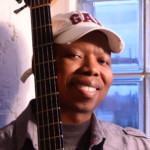
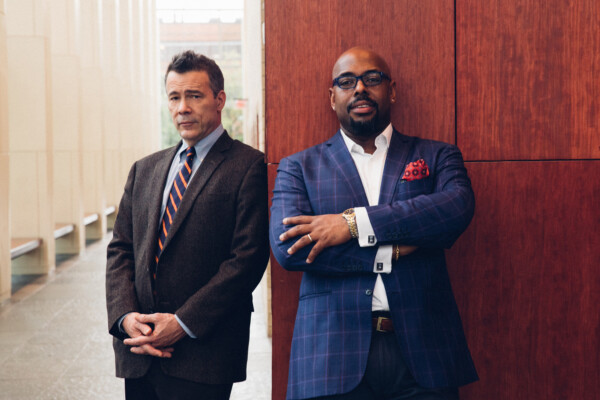
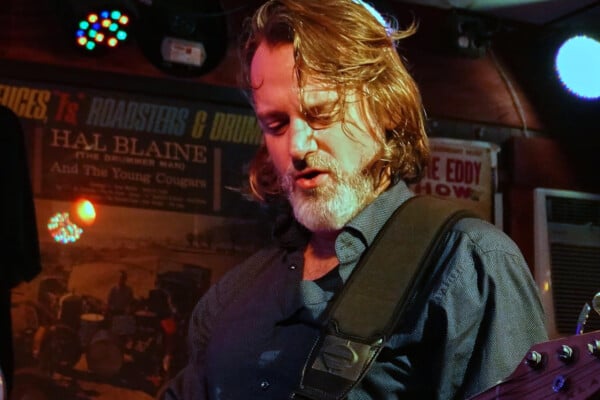
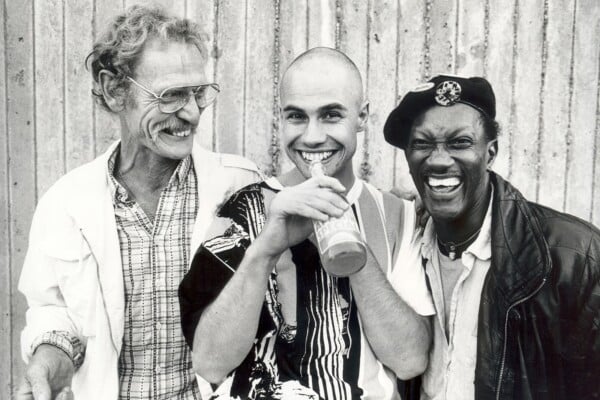
Squire… That’s Fendre’s economy brand, right?